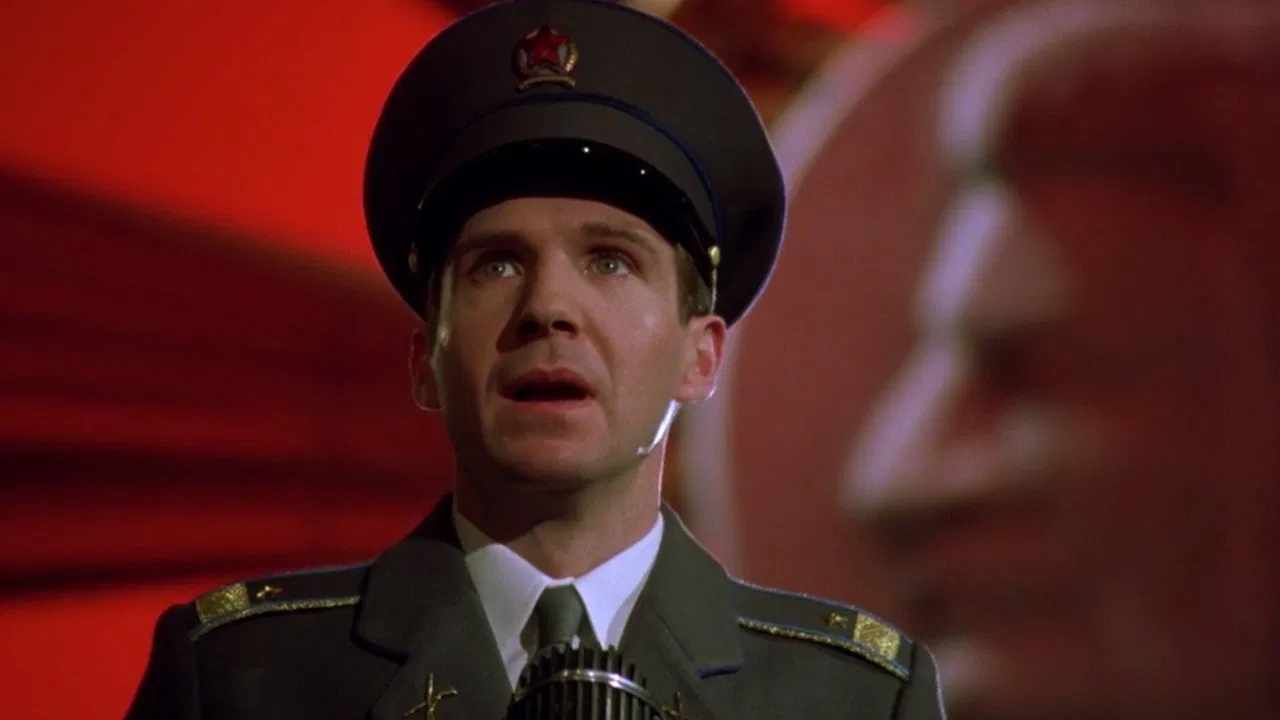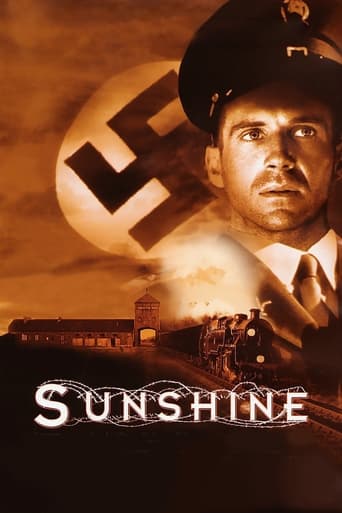

I LOVE Ralph... LOVE him. But despite the great film quality and generally great acting, I could not stay put...daydreamed half the movie away. BORING.. Cut in half and less focus on religious intolerance then OK. Jews were persecuted, so was everybody else in the long and brutal human history. Got it. Fatigue already. A film about the Jews saving other brutally oppressed people would be better. Go find that story.
... View More12 year old Emmanuel Sonnenschein left his village in the Austro-Hungarian Empire after his father died in a distillery explosion. Using his father's recipe, he creates a successful brew called "Taste of Sunshine" in Budapest. He has two sons Ignatz (Ralph Fiennes) and Gustave (James Frain). He also adopts his orphan niece Valerie (Jennifer Ehle). Ignatz becomes a prominent judge and marries Valerie. Gustave becomes a communist. The family struggles continue over the years as Ralph Fiennes plays different characters in each generation of Sonnenschein.This is a big ambitious movie. The idea of playing three generations within the same family may be compelling to Fiennes but they may be better off doing a trilogy. This could be also be a good TV series. There is simply too much material to contain in one sitting. Nevertheless Ralph Fiennes does a great job and the sweep of the whole experience is quite compelling.
... View MoreSunshine is one of those films I was predisposed towards liking before I'd even seen it. I liked the idea of a film dealing with three generations of a family (one that goes through war and revolution) and I liked the idea of Ralph Fiennes playing multiple roles. Consequently, I was pleased that the film lived up to my expectations.Ralph Fiennes is unquestionably the main reason why the film works so well. Each character he plays (the narrator, and the narrator's father and grandfather) is distinctive and separate from the rest while also having the traits of previous generations. For instance, each character is passionate and stubborn, and each is caught up in twisted love affairs and has to fight anti-Semitism, but while Ignatz is a free spirit who gradually becomes more and more bitter, Adam is a confident ladykiller and Ivan is a sullen bureaucrat who slowly comes to life towards the end. It's a subtle, unflashy performance, and one that works superbly.It also transcends gimmickry. But while Fiennes deserves credit for making his performance work, the writing and direction are also excellent. I especially like the way that certain themes resonate through the different generations each character has to fight against prejudice, is burned by people in power and has unsuccessful relationships. Times may change but people don't.This sentiment is proved true by the various regimes that inhabit the film. The Hungarian monarchy, the fascist military and the communists may all be different in terms of aesthetics, but at heart they're all the same. They're all power hungry and they have no loyalty towards their citizens; they may preach freedom, but all they want is control and the perks of authority. And through the film those in power betray each successive generation of the Sonnenschein family, and in each case anti-Semitism is at the root of the problem. Not that the family doesn't try its hardest to fit in. Ignatz changes the Jewish surname Sonnenschein to the more neutral Sors so that he can become an important judge. And for a while he prospers, but then the monarchy starts to talk of Jewish conspiracies. However, Ignatz stays loyal and he refuses to join the communists when they briefly take over, leading him to become incredibly bitter and to die a miserable death.But the family doesn't learn. Adam, Ignatz's son, becomes close to the military regime that takes over from the communists by becoming part of the Officer's Club fencing team. But like his father, he isn't allowed to becoming part of the club straight away. He's only allowed to join the elite fencing team after he's converted to Catholicism. The family's identity is being eroded even further. But he's driven to this decision by an inferiority complex. There's a scene where he's bullied by a gang of older boys as a child who mock the fact that he's Jewish. They hold a sword to his throat. They make him apologise for being Jewish and for polluting the air. This drives him towards fencing and he eventually becomes an Olympic champion. But the childhood scene is chillingly echoed in the scene where Adam is taken to a labour camp during the outbreak of the Second World War. The soldiers ask him what he is and he refuses to say that he's a Jew. Instead he says that he's an Olympic gold medallist. He's trying to assert his true identity, rather than the technicalities of birth and heritage. But the soldiers wont have it, and in the most powerful scene in the film, they strip and beat him while continually asking him the same question. He refuses to beg like he did as a child and to apologise for what he is and as a result he's strung up on a tree, and in the dead of winter, is hosed down. The water freezes on him and he dies with his son watching on.But despite watching this atrocity, Ivan (Adam's son) fails to learn the lesson it should teach him. It should teach him never to repeat these sorts of things. But instead, consumed by a desire for revenge and by naive idealism (his championing of Stalin is rather hard to stomach), he joins the communist party that takes over the country after the war. First he's asked to capture the fascists, but then as the communist party proves itself no better than anyone else, he's asked to betray friends based on trumped up charges. He even becomes like the guards who killed his father when he's asked to continue torturing his friend who refuses to confess to being part of a conspiracy. And on top of that he even has to endure more anti-Semitism the Jews make an easy scapegoat when you're incompetent (like the monarchy, the communists fear that the Jews are conspiring to take over the country). But unlike Ignatz and Adam, Ivan gets a second chance. He sees through the crap and leaves the party. And in the end he even changes the family name back from Sors to Sonnenschein. It's an excellent ending. It shows that you can't hide what you are and that it's better to stand up and be counted. Why feel shame for something there's nothing to be ashamed of? However, I do have a couple of minor gripes. First, the set-up is extraordinarily brief. I know the film is fighting for time, but the opening few minutes are a bit of a whirlwind. And secondly, Rachel Weisz's character is incredibly annoying. I didn't enjoy her performance at all. But those problems are nothing really. They certainly didn't prevent me from enjoying the film.
... View MoreThis historical epic/family drama from the master of Hungarian cinema, Istvan Szabo (Mephisto, 1981; Being Julia, 2004) is a wonderful and memorable film that has been overlooked, underrated and sadly under-seen.This is a moving and always engrossing drama about one Jewish-Hungarian family that rises and falls throughout the 20th century. Ralph Fiennes is outstanding as the grandfather, the father and the grandson. All three - complex and tragic characters, victims of their times, politics and wars. I think it was a brilliant idea to cast one actor as a face of three generations of one family. If ever anyone attempts to adapt Marquez's "One Hundreds Years of Solitude", that's how it should be done, IMO."Sunshine" is three hours long but never for a minute had I felt it was too long or it was losing its power. It is a serious, thought-provoking film which is also a superb work of art.9.5/10
... View More